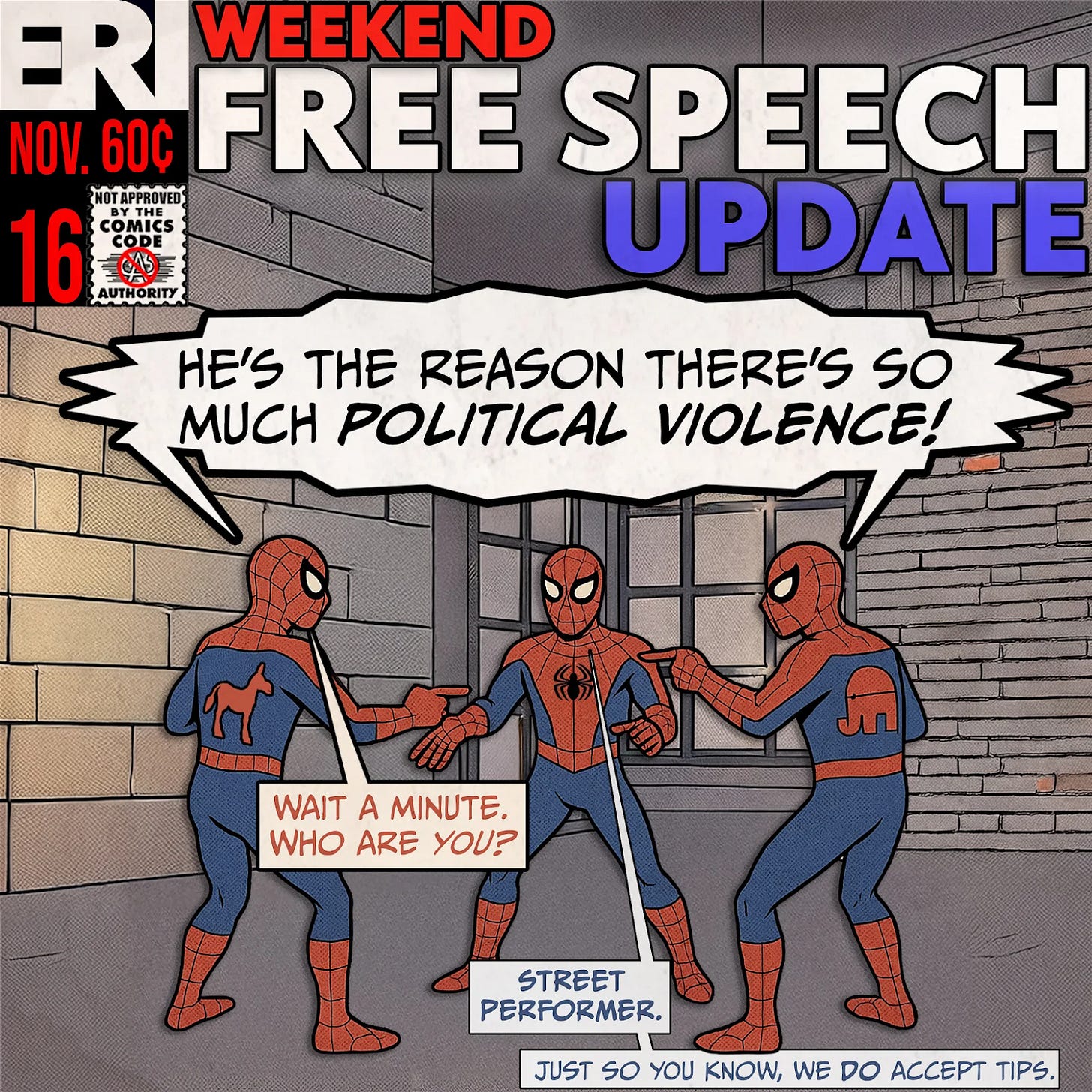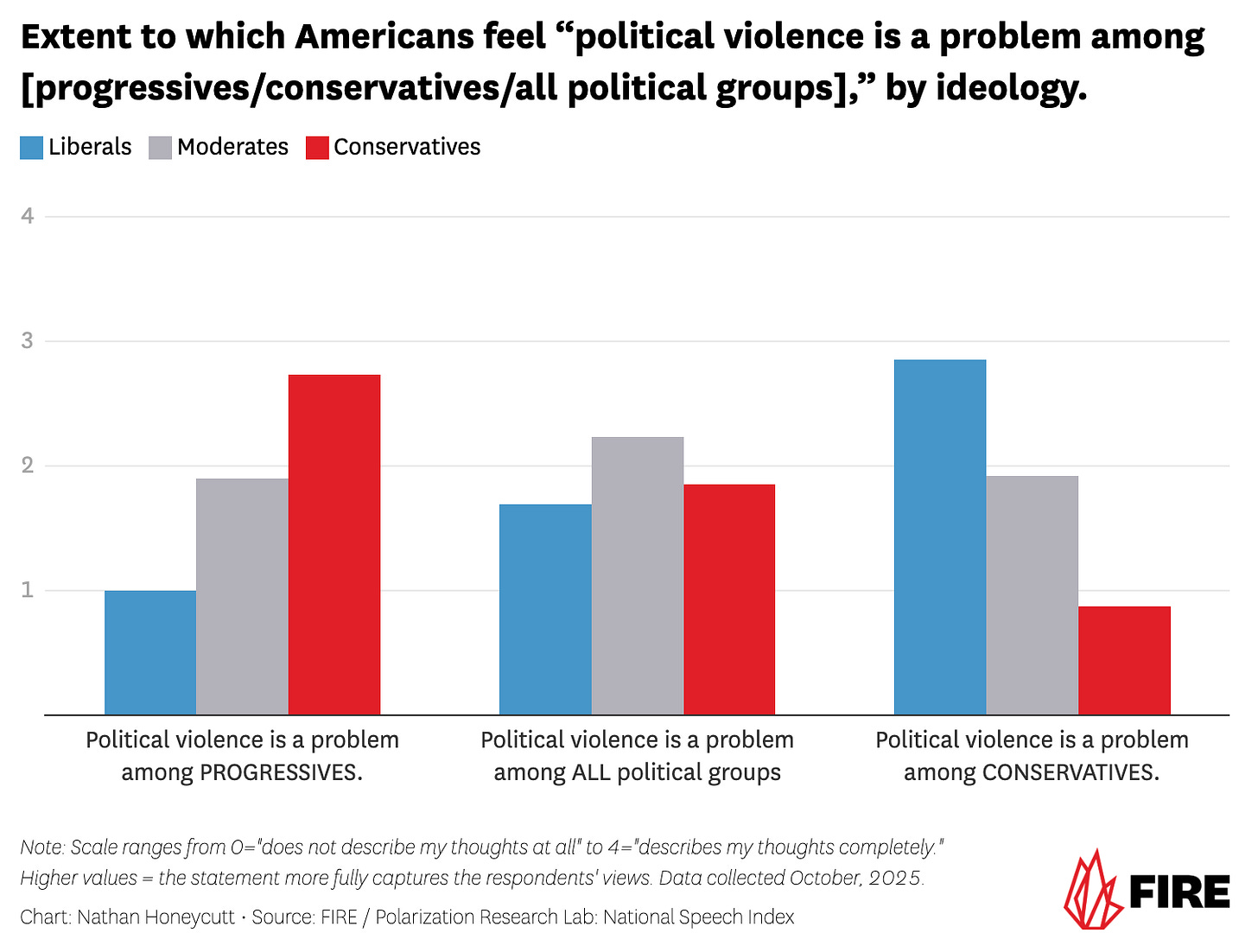TAMU bans whatever 'advocacy' is, journalists cash out after cops crash out, partisans point fingers on political violence, and more!
Bringing you the latest free speech news (11/16/25)
Stories of the week
The Texas A&M System Board of Regents today voted to strip faculty of the ability to determine curriculum around issues of “race or gender ideology” and “sexual orientation,” placing that power entirely into the hands of the institution’s president.
This is a fundamental assault on academic freedom. When given the opportunity to stand firm behind this basic principle, the Board chose to empower the censors and FIRE won’t stand for it.
With this new power, the institution’s president will be able to silence ideas they dislike and prevent faculty from pursuing knowledge wherever it leads.
This week in Expression
The bottom line with all of these proposed laws is simple: we must limit the government’s power to censor either directly or indirectly.
Three-quarters of Americans say free speech is headed in the wrong direction
Snipers, censorship, and unaccountability: Indiana University’s free speech crisis by William Harris
This week on So to Speak
This week, FIRE EVP and So to Speak host Nico Perrino spoke with his colleagues, FIRE General Counsel Ronnie London and Supervising Senior Attorney Conor Fitzpatrick about recent free speech news including SCOTUS’s oral argument in a case about conversion therapy, the Pentagon’s new press rules, and “what the hell is going on at Indiana University” among other topics.
This week in FIRE’s blog
George Mason demands pro-Palestinian student group remove video from social media, but public universities can’t do that by Tyler Coward
The NO FAKES Act is a real threat to free expression by John Coleman
Texas State’s ‘value neutral instruction’ walks a fine (and risky) line by Michael Hurley
Texas A&M board to vote on sweeping classroom censorship proposal by Robert Shibley
London Calling: Ronnie’s First Amendment Roundup
Federal court preliminarily enjoins administration from depriving University of California federal funds as a means of coercing First Amendment violations
Following in Harvard’s successful wake, associations and labor unions representing University of California employees, faculty, and students reliant on federal funding for research, salaries, and educational and professional development—i.e., to fund institutions where they work and attend school—have won a preliminary injunction against the administration’s denial of funds in its alleged “concerted campaign to purge ‘woke,’ ‘left,’ and ‘socialist’ viewpoints from … leading universities.” Plaintiffs alleged a variety of constitutional violations, including of the First Amendment, Separation of Powers, and Fifth Amendment Due Process, as well as claims of procedural violations of Titles VI and IX and of arbitrary and capricious agency action under the Administrative Procedures Act. The court found agency officials, as well as the President and Vice President, “publicly announced a playbook of initiating civil rights investigations of preeminent universities to justify cutting off federal funding, with the goal of … forcing them to change their ideological tune,” through a “concerted policy to use allegations of antisemitism to justify funding cancellations, when their intent is to coerce universities into purging disfavored ‘left’ and ‘woke’ viewpoints.” It described that “playbook’s” next steps as having funding agencies “cancel the school’s federal grants en masse without following Title VI and IX procedural requirements or limiting the scope of the terminations to non-compliant programs,” followed by “demands [of] payment of millions or billions of dollars” and “a wide range of policy changes as a condition for restoring funding and avoiding further funding disruptions.”
The court noted that while “antisemitism is undisputedly a laudable and important goal,” unrebutted evidence shows the agencies “have gone well beyond that stated purpose.” On the First Amendment claim that the administration unconstitutionally “jawboned” UC in violation of plaintiffs’ rights, the court held federal officials “almost certainly engaged in unlawful coercion and retaliation,” which has “already had a predictably chilling effect throughout the UC system.” In doing so, it rejected the government’s claim that its actions target discrimination and harassment rather than protected speech, holding that “overwhelming evidence” establishes the “goal is to purge disfavored viewpoints from universities, and specifically from the UC.” And it further held that even if officials were “solely motivated by stamping out antisemitic harassment,” they “may not accomplish that goal by coercing the UC into adopting practices with widespread chilling effects.” The court also held plaintiffs likely to succeed on their First Amendment retaliation claim, with the “unrebutted record” showing they “engaged in constitutionally protected activity, including teaching, research, and public speaking on disfavored topics, and participating in protests,” and that the federal officials’ efforts “would chill a person of ordinary firmness from continuing to engage in those activities.” The court rejected arguments it should treat UC as a contractor subject to a more permissive balancing test applicable to federal employees, declining “to adopt the view that any university that accepts funds” is “a ‘government contractor’ for First Amendment purposes, whose speech the federal government can regulate just as it would an at-will employee.” It also rejected as “not accurate” government arguments that future funding decisions are immune from “traditional First Amendment scrutiny” and/or judicial review, holding that even if the government is “entitled to withhold a benefit or impose conditions on it, they may not do so as a means of retaliating to deter disfavored speech.” Finally (on First Amendment issues), the court held plaintiffs likely to succeed on their unconstitutional conditions claim because the administration’s actions “are an effort to force the UC to suppress Plaintiffs’ members’ right to engage in disfavored speech, in exchange for the benefit of continued federal funding.”
International free speech stories of the week
Momentum builds for hate speech ban as president steps in (The Korea Times) by Jung Min-ho
Lee’s intervention is expected to bolster efforts to criminalize hateful remarks targeting foreign nationals or specific ethnic groups. The bill, led by Rep. Yang Bu-nam of the ruling Democratic Party of Korea, would expand the criminal code to make it a crime to publicly “defame or insult” certain groups, extending protections beyond the current focus on individual victims.
Israel: Bill to shut ‘harmful’ foreign media passes first reading (Middle East Eye) by Mera Aladam
BBC apologizes to Trump for documentary edits, but pushes back on legal threat (Politico) by Faith Wardwell
Exclusive: Ofcom is monitoring VPNs following Online Safety Act. Here’s how (TechRadar) by Samuel Woodhams
Video of the month
In 2023, law enforcement officers from the City of Marion, Kansas and the Marion County sheriff’s office raided the offices of local newspaper the Marion County Record, accusing the journalists there of identity theft in retaliation for lawful reporting by the paper’s staff. This week, the county agreed to pay more than $3 million and issue an apology for the unconstitutional raid.
Generally speaking, law enforcement isn’t supposed to be raiding newsrooms at all. The Privacy Protection Act of 1980, 42 USC Sec. 2000aa, requires law enforcement looking to seize a journalist’s work product — for example, interview notes, photographs, tape recordings, and so on— to name one of a finite list of special reasons for doing so. Otherwise, law enforcement is supposed to subpoena the journalist and ask them to bring the information to court, at which point lawyers and a judge can argue about whether that jurisdiction’s reporter’s privilege should protect the information from disclosure to the state.
One of those exceptions is that law enforcement can seize journalistic work product when they have probable cause to believe the reporter “has committed or is committing the criminal offense to which the materials relate[.]” The warrant from the Record raid claimed there was probable cause to believe the journalists engaged in identity theft.
And what was the probable cause for that belief, you might ask? A reporter looked up a driving record in a public database. Why did the journalist look up the driving record? To investigate a tip about a local restaurant owner’s driving record, related to an application for a liquor license renewal, that the newspaper ultimately didn’t publish.
The motivation seems to have been to harass the publication for its coverage in general, not in retaliation for this specific investigation. The Nebraska Examiner reports:
On July 25, 17 days before the raid, [then-Mayor] David Mayfield wrote on his personal Facebook page: “The real villains in America aren’t Black people. They aren’t white people. They aren’t Asians. They aren’t Latinos. They aren’t women. They aren’t gays.”
“They are the radical ‘journalists,’ ‘teachers’ & ‘professors’ who do nothing but sow division between the American people,” David Mayfield wrote.
Law enforcement seized computers and personal cell phones; they then raided the home of publisher Eric Meyer. The next day, the publisher’s 98-year-old mother Joan died, something Meyer attributes to the stress of the raid. The initial prosecutor said the warrant couldn’t be justified three days after it was executed, and later independent prosecutors determined that the warrants were improperly issued due to “inadequate investigation.”
The $3 million isn’t for claims against the newspaper alone. Also targeted for an illegal search was former vice mayor Ruth Herbel, who had also received a copy of the instigating anonymous tip that claimed the local restaurant owner was driving on a suspended license. The Lawrence Times quotes Herbel’s complaint to explain the government’s theory behind the warrants: “[B]ecause the letter listed the restaurateur’s driver’s license number, simply possessing the letter was illegal and that someone ‘obviously’ stole the restaurateur’s identity to get the letter.”
Of the settlement, $650,000 resolves Herbel’s claims against the county.
While $3 million is a lot, it’s not the end of the story. The raid against the Record involved two Sheriff’s deputies and five city cops. The existing settlement is with the county; claims against the city are still pending.






I think that there is missing context in this quote: "The court noted that while “antisemitism is undisputedly a laudable and important goal,”
It sounds like the court is praising antisemitism ...
"Finally (on First Amendment issues), the court held plaintiffs likely to succeed on their unconstitutional conditions claim because the administration’s actions “are an effort to force the UC to suppress Plaintiffs’ members’ right to engage in disfavored speech, in exchange for the benefit of continued federal funding.”
This is an absurdly stupid ruling on the face of it. So any university can essentially lock in their current funding forever, regardless of whether it meets government needs or intent, simply by deliberately pissing the administration off regularly and then accusing any attempt by the government to change its funding priorities of being retaliation? No, they ARE 'government contractors' as long as their salaries are being paid by the government and can be subject to the same constraints on how they use my tax dollars as any other federal employee. Shitty research deserves to get cancelled and being politically unpopular is not a valid reason to save it. Two things can BOTH be true: it's politically disfavored AND legitimately deserves to be cancelled as a counterproductive waste of government funds. The First Amendment does not confer any right to having your 'speech' subsided by your fellow citizens.